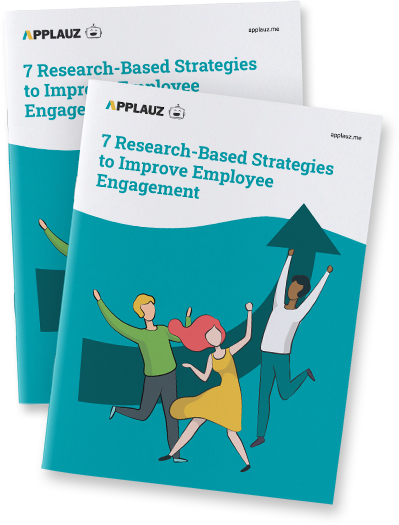Millennials—a.k.a the “Me, Me, Me Generation,” individuals born between 1980–1996 (approx)—have often been described as being a bunch of lazy, entitled narcissists who still live with their parents. Time Magazine ran a cover story in 2013, stating as much. Really.
Millennials have also been described as “Trophy Kids” or “snowflakes.” Suggesting that they have been coddled by their parents, reared on false or undeserved praise for their mere participation in activities, and now feel entitled to receive unjustified rewards.
Given that millennials will represent up to 75% of the global workforce by 2025, it’s time to discuss the reality of millennials in the workplace. So, what do millennials expect from their work? How can companies properly engage and recognize them?
Let’s debunk some myths first, shall we?
 Millennials in the Workplace: the Truth Behind the Myth
Millennials in the Workplace: the Truth Behind the Myth
Millennials aren’t kids anymore.
It’s been about eight years since Time Magazine ran their cover story about millennials being the entitled “me me me” generation.
 In 2020, millennials are now approximately between 24 and 39 years old. In short, this generation is all grown up. We are not so different from the generations preceding us. Yes, I am a millennial myself.
In 2020, millennials are now approximately between 24 and 39 years old. In short, this generation is all grown up. We are not so different from the generations preceding us. Yes, I am a millennial myself.
Many researchers have attempted to prove that millennials have different working attitudes than any other generation that preceded them; most of them have failed.
One study published in the Journal of Business and Psychology suggests that the only significant difference to be found between millennials and Baby Boomers (defined by the generation born between 1940 and 1965) is in how they interpret workplace ethics.
What’s more, recent studies show that millennials quit their jobs for the same reasons that any other generation before them has: that is to say, for more money, a better working environment, more job flexibility, and a strong respect for work-life balance.
How do millennials differ from other generations?
The significant difference is in the social and economic climate millennials grew up in compared to previous generations.
First, millennials grew up during a massive technological shift. They were born with the internet and personal technology at their fingertips. Learning how to use technology in its most rudimentary and early forms--cue the clunky floppy disk and CD burners. All these experiences have shaped the way millennials live and experience the world around them, including work.
 Second, millennials in the Western world experienced their formative years during the 1990s and early 2000s, a time of questionable hairstyles and fashion choices, but most importantly, a time of massive economic growth and prosperity. Jobs were plentiful; incomes soared, stocks quadrupled in value. It was a decade characterized by consumerism, comfort, and abundance.
Second, millennials in the Western world experienced their formative years during the 1990s and early 2000s, a time of questionable hairstyles and fashion choices, but most importantly, a time of massive economic growth and prosperity. Jobs were plentiful; incomes soared, stocks quadrupled in value. It was a decade characterized by consumerism, comfort, and abundance.
This generation had their fundamental security and safety needs met, and more. The downside of having all your basic physical needs met is that it doesn’t ensure more profound, complex emotional and social needs are met. As we all know, the burst of happiness we experience from buying something new and shiny is fleeting.
At the same time, the existence of religion and local communities slowly began to lose presence in people’s lives. With fewer activities and groups to fulfill deeper emotional needs for belonging and affiliation, millennials began looking to other parts of their lives, such as their work or careers to offer a sense of belonging and identity.
 In short, what an entire village used to provide in the past, millennials now expect the same from employers.
In short, what an entire village used to provide in the past, millennials now expect the same from employers.
Understandably, this applies pressure to businesses, especially those small to medium-sized companies that may not possess the capital or resources to cultivate and grow such a vibrant organizational culture.
Organizations that are exceptional at retaining talent can create a climate that perpetuates the type of affiliation, inclusivity, and belonging that people derived from communities in the past. You don’t need a massive budget to accomplish this. Follow some of the tips and strategies below to kick-start your engagement initiatives with your millennial workforce.
7 Research-Based Strategies to Improve Employee Engagement in 2025
 Company Values & Culture Proven to Engage Millennials in the Workplace
Company Values & Culture Proven to Engage Millennials in the Workplace
Value 1: Innovation

Millennials grew up during a time of unprecedented innovation and technological advancement. As a result, millennials don’t fear technological change and innovation; they embrace it.
As a case in point, one of my first office jobs was for a small family-run company that was still using outdated technology such as fax machines in 2012. This company seemed frozen in time. Needless to say, my time there was short and sweet.
Moreover, the tech learning curve is steep for savvy millennials; they don’t need weeks or months to learn how to use new software or technology; it comes intuitively.
In sum, this generation respects and takes pride in working for organizations that strive to be innovative and are also open to adopting new technologies.
Here are some concrete examples of the value of “innovation” in action.
Adopt new technology
Has your company been using the same clunky programs since 2002? If yes, it's time for a tech stack facelift.
It’s understandable, that overhauling and changing systems can be a daunting and potentially costly task. However, keeping antiquated and ineffective systems can be just as expensive in more ways than one. Most importantly, as millennials (and even younger generations now) enter the workforce, they will naturally gravitate towards innovative companies that embrace technological change, as they do.
 Use tech-savvy incentives and rewards programs
Use tech-savvy incentives and rewards programs
A recent Colloquy survey of 1,000 loyalty program members found that 18% of millennials stopped participating in a program because it lacked a smartphone app, compared with 13% of the general population. The same goes for employee engagement and recognition programs. Millennials want to be able to use tools they find useful to perform their work and access their work anytime from the comfort of their smartphone.
Use gamification
That might feed the “Trophy Kids” rumor, but millennials understand the fulfillment that a good game provides. This generation grew up with Xboxes and PlayStations, mobile gaming, and wearable activity trackers.
The lesson to be learned here is that if you’re working, you might as well make it fun! Colloquy found that of the millennials surveyed, introducing a competitive gaming element in a company loyalty or recognition program was welcomed and well-received.
27% of millennials participated in their company’s recognition program because it featured a game-like, or social component, such as badges, leaderboards, points attribution, or a company Newsfeed, while only 7% of baby boomers said the same.

Value 2: Openness & Flexibility
With the support of technology, workers, and professionals can essentially do their job from anywhere at any time. Why is it then, that most organizations still demand modern-day workers to clock in and out of their workplace?
Millennials want their employers to embrace their differences. Perhaps some people thrive off the energy of the morning and produce their best work before noon. While others, more night-time-oriented individuals, find themselves most productive in the evening after 7 pm.
Let me ask you this: If an employee delivers quality work by a given deadline, does it matter when and under what conditions it was completed?
That said, here are some ways your organization can implement strategies that demonstrate flexibility and openness.

Flexible work schedule
While the old 9-5 work schedule has proven itself over the years, it can now be a little outdated and stifling to young workers.
Studies show that millennial workers would instead like to manage their own time. Ernst & Young's recent survey reveals that millennials place a high value on flexible work arrangements and are the generation most inclined to switch jobs, forgo promotions, relocate to a new city, or accept a salary reduction to attain flexibility in their work.
For example, you can start small, allowing your employees flexible start and end times. They can come in anytime between 7 am and 10 am and leave after the workday is done.
Work remotely
If you want to take the flexibility a step further, you can allow employees to work from home a certain number of times a month or week.
Worried that workers will be even more distracted and unproductive at home?
Think again. Employee Engagement Firm TINYpulse surveyed 509 full-time remote workers in the U.S. and compared their answers to 200,000 workers across other work arrangements. According to the survey, 91% of remote workers believe they "get more work done when working remotely."
Half days on Friday's
The option of offering your staff a half-day on Fridays would give them precious needed time to get chores done before the weekend begins, using the weekend as a time to relax and recharge instead of running around trying to catch up on chores and housework.
If your business operates out of a four-season climate, this is especially beneficial when the warmer months roll around. Employees will appreciate having extra time to spend outdoors and in the sun, which is greatly missed during the dark winter months.
Value 3: Personal Development
Our identity and what we do for a living are often inextricably linked. It’s more common to hear people say, “I’m a writer” than, “I write articles for a living.” The former suggests that one is quite literally the embodiment of their chosen profession.
Millennials look to work not only to grow their technical and professional skills but for personal development as well. Providing a work culture that is challenging and continuously supports long-term goals is essential in retaining top talent.
Here are some actionable ways your organization can support these needs.
 Recognize outstanding achievement
Recognize outstanding achievement
87% of recognition programs at work focus on tenure, while millennials like to be recognized for their exceptional respect for time and punctuality. Indeed, 85 % of them primarily want to be rewarded for exceeding personal performance levels, according to the 2015 Blackhawk Engagement Solutions’ Employee Research. What’s more, they also want their stellar performance record to be considered as a basis for promotion.
Give back to your community
Social responsibility is an important factor that millennials consider when they start working for a company. In fact, according to the 2014 Millennial Impact Report, 87% of millennials have participated in a company service day. What’s more, a whopping majority of millennials (94%) want to use their professional skills to benefit a cause. So, if you want to engage and retain millennials, why not give them one, or several paid charity days a year?
Final Thoughts
The media wishes to paint millennials as avocado-eating snowflakes. But the truth is, we aren’t so different from other generations. Millennials want connection and belonging— the same fundamental needs that transcend generations.
Unlike popular beliefs, millennials are an ambitious bunch. They have high expectations when it comes to working--searching for careers that are stable but also fulfill deeper needs.
Suppose organizations want to keep top millennial talent. In that case, they must start thinking not bigger, but deeper. This means focusing on building a work culture that’s not only a place where people labor toward profit but also a place that promotes a cooperative community.
About the author
 Michelle Cadieux
Michelle Cadieux
Michelle is a content writer for Applauz. She holds a Bachelor's degree in Psychology from Concordia University, and she has been writing about work and employee happiness for over five years.


